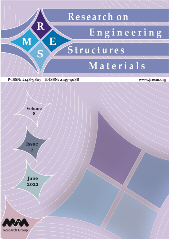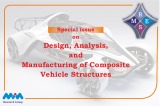Research Article
Capabilities and limitations of existing finite element simplified micro-modeling techniques for unreinforced masonry
Nitin Kumar1, Michele Barbato1, Erika L. Rengifo-López2, Michele Barbato1
1Department of Civil and Environmental Engineering, University of California, Davis, U.S.A.
2Department of Civil and Environmental Engineering, University of South Carolina, Columbia, U.S.A.
Keywords
Abstract
Unreinforced masonry;
Finite element modeling;
Simplified micro-models;
Earthen masonry;
Nonlinear constitutive models
Finite element (FE) simplified micro-modeling techniques are commonly used to investigate and predict the mechanical behavior of masonry structures because they provide a good compromise between accuracy and computational cost. These FE techniques generally discretize masonry structural elements into expanded masonry units and zero-thickness interface joints of assumed known locations. These joints correspond to actual masonry joints and to preferential cracking surfaces, which are often placed vertically in the middle of the expanded masonry units to simulate the cracking mechanisms that are typically observed in masonry bricks and blocks. Three different versions of simplified micro-models (SMMs) are widely used in the literature to model the response of masonry walls and assemblies: SMMs with rigid, elastic, and elasto-plastic constitutive models for the expanded masonry units. All SMMs are based on the hypothesis that the masonry inelastic behavior and cracking are concentrated along the pre-defined zero-thickness interface joints. The hypothesis is often satisfied for ordinary masonry, in which masonry units are generally stronger than the masonry joints, i.e., mortar and unit-mortar interface. However, this hypothesis is not always satisfied for historical masonry with units of irregular shapes or for earth block masonry, in which masonry units and masonry joint can have similar mechanical properties. This paper highlights the capabilities and limitations of SMM techniques by comparing the experimentally-measured and numerically-simulated response of ordinary and earth block masonry walls, for which well-documented experimental results are available in the literature. It is found that SMMs can properly reproduce the mechanical behavior of masonry when the masonry units are significantly stronger than the masonry joints; however, SMMs produce poor estimates of the mechanical response when this hypothesis is not satisfied. This finding highlights the need to develop more general FE models to investigate the mechanical behavior of different masonry materials and construction techniques, as well as to identify the parameters controlling the cracking patterns and the conditions under which SMM techniques can be accurately use.
© 2022 MIM Research Group. All rights reserved.

